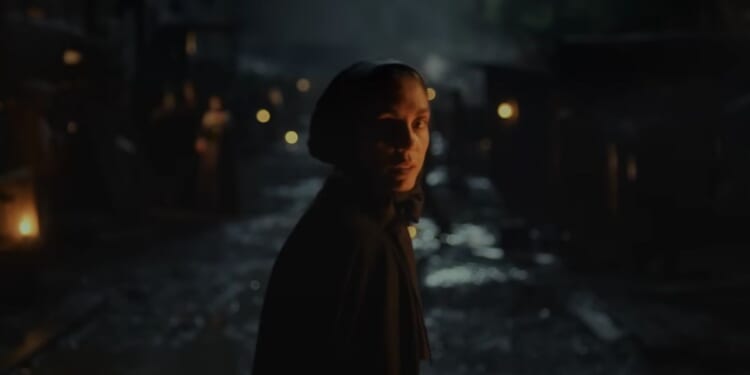Here’s a bizarre cause and effect: Because a wealthy businessman saw a bit of himself in a feisty nun from the late 1800s, the movie “Cabrini” was born.
Curiously, the first time that businessman — J. Eustace Wolfington of King of Prussia, Pennsylvania — was approached to finance the film, he said no. Wolfington wasn’t a fan of the movie pitched to him. He described it as a sentimental “fairy tale” version of Mother Frances Xavier Cabrini, his favorite Saint, according to The Philadephia Inquirer.
What struck Wolfington about Cabrini’s story wasn’t her connection to the Catholic faith. What inspired him was her entrepreneurial grit. That’s the story Wolfington chose to raise a hefty $50 million for, and that’s the movie that just took the number four spot at the box office this past weekend, per Box Office Mojo.
“They wanted to make her a fairy tale,” Wolfington told The Inquirer. “I had to make a better movie — to capture who she was, a woman who didn’t take ‘no’ for an answer… You don’t need to show all the preaching and praying, because her life is the sermon.”
“Cabrini” defies all expectations.
Whether you’re the left-leaning media hoping for Angel Studios to fail, or a member of the studio’s passionate conservative fanbase hungry for an epic follow-up to “Sound of Freedom,” this film isn’t quite what you probably expected.
Despite centering on the story of a nun, “Cabrini” — in this writer’s opinion — is not a faith-based movie, which may surprise the aforementioned conservative audience.
To the lament of the left-wing media, however, it is an amazing one.
Have you seen “Cabrini”?
Angel Studios‘ newly released biopic is epic in scope, deeply personal in feel and incredibly artistic overall. Simply put, it is masterful filmmaking.
By year’s end, it’ll undoubtedly be one of 2024’s best films.
The Story
The film follows the real-life journey of “the [Catholic] patron saint of immigrants” Francesca Cabrini, who lived from 1850 to 1917.
That entrepreneurial grit so admired by Wolfington helped Cabrini found what she called “an empire of hope” made up of 67 schools, hospitals and orphanages across the world, from America to Europe and even Asia.
The film follows the first step of that journey — Cabrini’s visit to New York City to help the seemingly hopeless, dying and impoverished Italian immigrant children literally living in the gutters.
Throughout the film, Mother Cabrini is forced to combat pushback from all sorts of institutions, including the government, socialites and even the church itself, each of which has reservations about helping the Italians.
Through her sheer determination and refusal to take no for an answer, Cabrini does what she must to save those dying, homeless children.
The Final Verdict
The team behind “Sound of Freedom,” including director Alejandro Monteverde, also put together “Cabrini” — and it shows.
The camera work, production design and cinematography especially are absolutely stunning.
Many comparisons have been made between the dilapidated New York City streets of “Cabrini” and those of Martin Scorsese’s “Gangs of New York” (that comparison should tell you something about the level of film “Cabrini stacks up with).
Lighting is used brilliantly throughout to highlight both the highs and lows of Cabrini’s story, creating stunning images of the character shrouded in darkness and light.
Many of the frames from this film are so picturesque they’ll make you want to print them out to hang up in your living room.
Equally impressive to the work behind the camera is the work in front of it.
Among the cast are award winners such as David Morse and John Lithgow.
Lithgow plays a truly despicable villain, the racist mayor of New York who wants nothing to do with the Italians.
Morse is also wonderful as Father Corrigan, the archbishop stationed above Cabrini.
The star of this film, however, truly stands above the rest.
Cristiana Dell’Anna’s performance as Mother Cabrini is on par with Jim Caviezel’s performance as Tim Ballard in “Sound of Freedom,” if not better.
In the Hollywood of today, we get to see lots of leading ladies take on male authority figures. What we rarely see, however, is one who manages to do so with quiet restraint.
Also, unlike many of today’s depictions of “strong” women, Dell’Anna remain charming, loving and utterly feminine throughout the film.
“Cabrini” Is Not Feminist
At first glance, one might mistake the film’s core message for a feminist one.
After all, it follows a strong, self-confident woman taking on the male heads of various societal institutions (what the left often describes as “the patriarchy”).
Angel Studios’ marketing certainly leaned into “International Women’s Day” and messages of female empowerment, a risky move considering the studio’s core audience and the associations at play.
The film also leans into themes of racism, sexism, xenophobia and so on.
Additionally, one of the protagonist’s primary motivations is a desire to overcome expectations thrust on her as a sickly woman.
Because of all this, I expected some of the reactions to the movie to look a bit like this:
This is a reaction I expect MANY conservatives will have to the film.
My review Monday will explain why I believe that outrage is entirely misplaced. pic.twitter.com/DWhwAsnqmN
— Michael Austin (@mikeswriting) March 9, 2024
All that said, this is in no way a feminist picture.
The above themes, as attractive as they may be to a leftist, are treated with a heavy dose of realism. The world isn’t depicted as some patriarchal structure designed to oppress. It’s treated as a fallen place with full of sin.
Also, Cabrini is a woman motivated by her feminine desire to help children.
At one point in the film, when speaking about her and her sisters, Cabrini delivers an unforgettable line that no feminist would dare utter: “No man can do what we do.”
She’s absolutely correct.
The film is filled with scenes of motherly nuns nurturing, teaching and loving children. In those moments, the audience is reminded of what true femininity looks like.
One Caveat
One of the greatest evils currently perpetuated in Hollywood is the erasure of Christ from all storytelling.
Famous books and stories where Christ and the Christian faith should be front and center are consistently re-tooled to feature more humanist messaging.
This has been going on for decades.
The great Andrew Klavan of the Daily Wire — a former Hollywood screenwriter — sums it up best:
“Editing God — and specifically Christ — out of stories where He belongs is so endemic to our intellectual and elite class, there ought to be a ‘Delete Jesus’ key on their computers,” Klavan said.
Now, when I heard that Angel Studios was making a movie about a nun, I figured Christ would make his way into the story, at least to some degree.
He didn’t.
This headline from “Catholic World Report” sums it up rather well — “Cabrini is a beautiful film, but lacks a Catholic core.”
The Blaze’s Steve Deace voiced a similar criticism (though, like this writer, Deace also gave the film a glowing review).
My review of #CabriniMovie — this is a beautifully shot and scored film. In fact, it is the highest-quality piece of craftmanship Angel Studios has released thus far. In terms of production value it is top shelf. You may not see a better made drama this year.
But when it comes…
— Steve Deace (@SteveDeaceShow) March 9, 2024
Don’t get it wrong. This is not to say an overly saccharin “God Is Not Dead” sort of message — one that comes across more Hallmark than Hollywood — would’ve made this film better.
Show don’t tell is a writing lesson many Christian films like those could learn from. I certainly wasn’t wanting Cabrini to sing “Jesus Loves You” or read out the Gospel straight to camera.
But I was hoping the story could show Christ’s involvement in her life, and how Cabrini’s faith in Jesus played a role in her story.
The film did not.
What it did was show a powerful, humanist story about how a woman persevered defiantly against the expectations placed upon her.
Regardless, the fact that Angel Studios made what will likely be one of the best movies of the year, with good values at its core, is an astounding success.
If you have a chance, you should absolutely buy a ticket to go see “Cabrini” in theaters.













